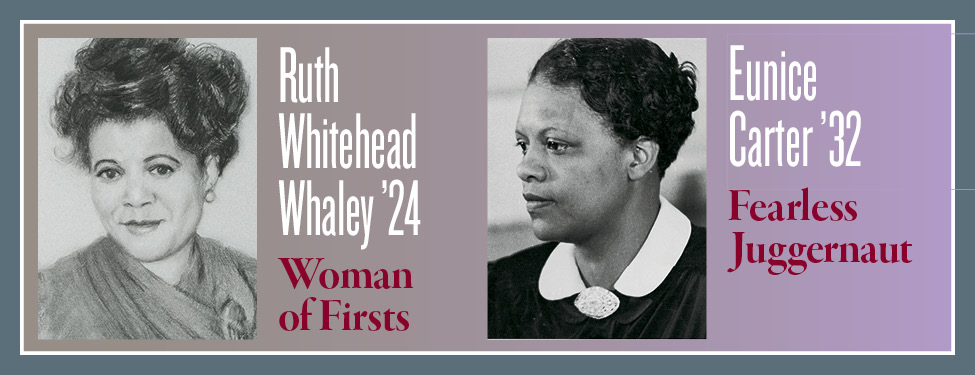Ruth Whitehead Whaley
Ruth Whitehead Whaley’s life is a compelling story of firsts.
- First black woman to enroll at and graduate from Fordham Law School
- First black woman to practice law in New York state
- Founder and first president of the Black Business and Professional Women’s Club
- First black woman to pass the North Carolina bar exam
- Expert in civil service law

Ruth Whitehead Whaley’s life is a compelling story of firsts. The first black woman to enroll at Fordham Law, Whaley graduated at the top of her class in 1924. In 1925, she became the first black woman to practice law in New York state, and in 1933, she was the first black woman to practice law in her home state of North Carolina.
Whaley was born on February 2, 1901, in Goldsboro, North Carolina, to two schoolteachers, Charles and Dora Whitehead. An outstanding student, Whaley attended Livingstone Prep School and Livingstone College in Salisbury, North Carolina, going on to work as a teacher at the North Carolina State School for the Deaf in Raleigh after she graduated college in June 1919. Whaley married Herman S. Whaley on July 3, 1920, in Goldsboro. The couple had two children, Herman M. Whaley and Ruth M. (Whaley) Spearman.
With her husband’s encouragement, Whaley made the decision to attend Fordham Law School, which had voted to admit women students only a few years before her enrollment. While at Fordham Law, Whaley corresponded with famed sociologist, historian, and civil rights activist W.E.B. Du Bois regarding an instance of discrimination that she had experienced during her 3L year. Whaley had won a writing contest due to an excellent series of her papers, and she was entitled to receive the reward of a free set of books. However, she was denied the prize for reasons that were never made clear to her, and she was stonewalled by administrators when she attempted to find out why. It turns out the prize was withdrawn at the last minute when the donor learned of Whaley’s race. Thanks in part to Du Bois, Whaley’s story was made public in the July 1924 issue of The Crisis, the official publication of the NAACP.
Despite this shameful institutional incident, Whaley called her time at Fordham Law “for the most part pleasantly and profitably spent,” praising the School for its “magnanimous spirit and lack of caste.” She graduated cum laude in 1924.
After earning her Fordham Law degree, Whaley went on to a distinguished career in private practice. Widely regarded as an expert in civil service law, she won several landmark cases in this area, and often argued before the Second Circuit Court of Appeals. She was particularly recognized for her outstanding representation of black local government employees, including in one instance her husband. She maintained her practice in New York until 1944 when she began to get involved in Democratic Party politics.
In 1945, Whaley ran for a New York City Council seat as one of the first black women ever nominated by a major political party in the United States. In 1949, she wrote an essay titled “Women Lawyers Must Balk Both Color and Sex Bias,” in which she described the “penalty” of women—and particularly minority women—lawyers who must outperform their male colleagues lest “the overlooked errors of a male colleague become the colossal blunders of the woman.” In the essay, Whaley also expressed concern about the continued lack of black female lawyers in the country, noting that in 1920 there were only four, while in 1949, there were fewer than 150, with fewer than 100 of these actively practicing law.
From 1951 to 1973, Whaley served as secretary of the New York City Board of Estimate, assisting in numerous areas of municipal policy, including city budget, land-use, contracts, franchises, and water rates.
Throughout her life, Whaley was highly active in organizations dedicated to the advancement of African Americans. She was the founder and first president of the Black Business and Professional Women’s Club, and she served as the president of the National Council for Negro Women. She was especially renowned for the career assistance she provided to aspiring black lawyers at a time when racial discrimination was rampant in the United States. She was also a member of the Fordham University Council, a body of prominent individuals who served as ambassadors for the University.
Ruth Whitehead Whaley passed away on December 23, 1977.
Today, a number of societies, awards, and scholarships are named in her honor. The Association of Black Women Attorneys’ Ruth Whitehead Whaley Scholarship is awarded annually to law students on the basis of service to their community and financial need. At Fordham Law, students in the top 25 percent of each class are honored as Ruth Whitehead Whaley Scholars. And the Ruth Whitehead Whaley Trailblazing Alumnus Award, instituted in 1979, is awarded by the Black Law Students Association to Fordham Law alumni who “embody Whaley’s bold spirit and commitment to excellence.”